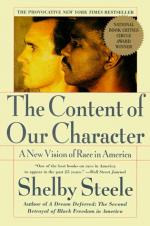
|
| Name: _________________________ | Period: ___________________ |
This test consists of 15 multiple choice questions and 5 short answer questions.
Multiple Choice Questions
1. When someone uses their race to avoid addressing how he / she really feels about something, the person is engaging in what, said Steele?
(a) Truth.
(b) Race-holding.
(c) Racial expression.
(d) Denial.
2. What two adjectives did Steele use to describe his editor?
(a) Firm, helpful.
(b) Sensitive, understanding.
(c) Caring, considerate.
(d) Bright, hard-working.
3. Steele stated that although some of his life experiences may be different from other races, what is true?
(a) He is of a superior race.
(b) He should not be judged by his race.
(c) He is of an inferior race.
(d) There is nothing different in the processes that drive his mind.
4. What did Steele say he had to seek in order to explain 'racial specifics'?
(a) The psychology of racism.
(b) Human universals.
(c) The general populations' opinion of him.
(d) Self-confidence.
5. What did Steele learn about himself when writing The Content of Our Character?
(a) How others viewed him.
(b) It was necessary to write the book with a partner.
(c) That he was not a great writer after all.
(d) How he thought.
6. What is Steele's son's name?
(a) Mark.
(b) John.
(c) Eli.
(d) Shelby III.
7. Of Jesse Jackson, Steele said he addresses the feeling of powerlessness in the following way(s):
(a) Sometimes agrees and ignores.
(b) Fully agrees.
(c) Always ignores.
(d) Sporadically bargains and challenges.
8. In Steele's opinion, why do blacks avoid 'important opportunities'?
(a) Other races forbid them from doing so.
(b) They are never in a position to engage in 'important opportunities'.
(c) They do not want to run the risk of failing.
(d) They do not avoid 'important opportunities'.
9. In terms of 'creating a black identity', what did Steele say is something that blacks engage in?
(a) Writing.
(b) Singing.
(c) Compensatory grandiosity.
(d) Dancing.
10. Steele said the only way to solve racial problems is to focus on what?
(a) Ethical consciousness.
(b) Racial consciousness.
(c) Sexual consciousness.
(d) Moral consciousness.
11. With regard to racial insecurity, blacks prove this by portraying what type of attitude about black pride, according to Steele?
(a) They hate it, but act like they are very fond of it.
(b) They secretly love it, but act as if they hate it.
(c) They hate it.
(d) They are obsessed with it and make that well-known.
12. What nickname did Chapter 4 say some blacks are given when they strive for achievement?
(a) Sell-outs.
(b) Squares.
(c) Non-conformists.
(d) Oreos.
13. It's Steele's belief that what creates a false reality for blacks?
(a) Denying shame.
(b) Graduating from college.
(c) 'Acting white'.
(d) Affirmation from few whites.
14. What topic of discussion did Steele and his friends 'suddenly' bring up?
(a) Relationships.
(b) Careers.
(c) Sex.
(d) Race.
15. What does Steele say about the vulnerability of blacks?
(a) They are sexually vulnerable.
(b) They are racially vulnerable.
(c) They are racially and socially vulnerable.
(d) They are socially vulnerable.
Short Answer Questions
1. What did Steele say is the driving force when one gives utmost attention to race?
2. What group do many blacks say 'failed to recognize' what Steele failed to recognize?
3. What does Steele say is one of the downfalls of the 'black identity'?
4. What does Steele say would be the secret to writing this book, if there was such a a thing?
5. How did Steele say Bill Cosby deals with the feeling of powerlessness?
|
This section contains 588 words (approx. 2 pages at 300 words per page) |

|




